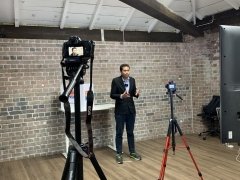Young migrant entrepreneurs finding ways to thrive
Despite many setbacks, young migrant entrepreneurs are finding ways to thrive in New South Wales.
Prospects for International students and aspiring entrepreneurs appear quite bleak. Between being threatened with deportation in the US, increased geopolitical tensions between home and host countries, and a ‘perfect storm’ for employment exploitation.
Thankfully New South Wales is bucking this trend.
Haymarket HQ has continued to find new ways to support migrant entrepreneurs, including hosting the FFWD HUB Finals Night on 8 July. Celebrating the hard work and entrepreneurial tenacity of international students in New South Wales.he FFWD HUB team, supporters, mentors, and judges, guided 100 aspiring entrepreneurs from 33 countries to develop their ideas from scratch, to pitch ready teams.
The Pitch Night featured the top 7 startup ideas developed throughout the virtual FFWD HUB program. These teams pitched their startup idea to investors and industry mentors, with the chance to win 3 months office space in the city. (If you missed the event, you can re-watch it here).
As a judge for the event, it was obvious how these young entrepreneurs had discovered problems in their everyday lives and assessed how they were uniquely placed to creatively solve them. One competitor saw how her international student friends were struggling to find affordable housing as well as many elderly Australians living alone so explored a marketplace platform to match the two sides.
Using the Lean Methodology, the program was built on the idea that entrepreneurial skill-building and confidence is the key to landing a first job – or even creating your own source of income!
Jonathan Chak (who is also one a UNSW Founders Startup Coach) spearheaded the program, guiding the students and their startup ideas over 6 weeks. (PS remember UNSW-affiliated startups can book in a coaching session with Jonathan here!)
Chak’s program looks at the fundamentals of early stage startup science:
Setting up your experiment (to test your hypothesis)
Defining your customers
Creating a landing page
Running your experiment
Upgrading your experiment
Building your MVP
CareerCare, who took out second place on the night, had surveyed over 100 students and advisors to get a deep understanding of what problems their users are facing when choosing a career after graduation. Raditia Haryo Kusuma and Roshan Bharwani, who are both international students studying at UNSW and involved in the Founders Coach&Connect program, have already created a 400+ strong community within 6 weeks of coming up with the concept. (Watch their full pitch at 33:35mins).
Another startup, EcoFoodly, created by recent UNSW graduate and UNSW Founders Pre-accelerator participant Jeffrey Lu, is aiming to reduce food waste in supermarkets and give people access to cheaper and fresh produce. Lu has created a testing model for the future app, by simply connecting people in a Facebook group. Group members share discounted food they find at supermarkets, flagging it for other users to also benefit.
It is well documented that immigrants contribute disproportionately to entrepreneurship, both here in Australia and abroad and these entrepreneurs provide us with more diversity and innovation in our entrepreneurial ecosystems, from social enterprise to tech.
Immigrants are not just starting more businesses in their host countries. According to some metrics, they are building more successful ones. A Harvard Business school study comparing immigrant-founded businesses in the U.S to local-founded ones showed that the immigrant-founded companies perform better in terms of employment growth over three- and six-year time periods.
Fellow FFWD HUB judge Khunapong Khunaraksa provided inspiration for the young entrepreneurs, who may be unsure to take the plunge into starting their own projects. Khunaraska, who graduated from UNSW Master of Engineering in 2010, is a water and sustainability expert, helping build a $2.1m portfolio for water.org over the last decade. These days, he coaches young entrepreneurs on storytelling and how to make their pitches more attractive to investors and customers.
It is clear international student and immigrant entrepreneurship are beneficial for the Australian startup and business ecosystems. Chak, who was once a migrant entrepreneur himself, reflected on the program; “Practising entrepreneurship helps with the transformation of our own being.” He witnessed student entrepreneurs at the FFWD HUB “transform from not knowing where to start, to confidently reaching out to their customers, and pitching their idea in front of the camera.”
Despite the chaos of the past six months, it’s been great to see the community support for international student entrepreneurs. COVID-19 restrictions have meant that most startup programs in Australia, including UNSW Founders and FFWD HUB, have transitioned online. This has also opened broader and farther reaching support to entrepreneurs, irrespective of geographical location.
During the UNSW Founders Pre-accelerator program, I’ve sat is breakout rooms with founders based in India, Pakistan, Indonesia and the U.S - some like Awais from XpertFlow - who are waking up around 4am in the morning just to join sessions and meet other entrepreneurs.
We hope to see the entrepreneurial community meeting again in person, and for international students to be able to study where they like. In the meantime, I’m going to appreciate the connections I’m making from across the world and take joy in watching student entrepreneurs innovate and thrive in difficult times.
Tash Jamieson is the UNSW Global Founders Program Manager. You can book in a Coach & Connect session with Tash here, and start strategising how to make your startup idea a reality.




